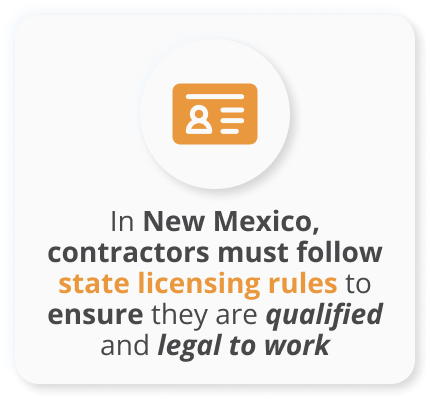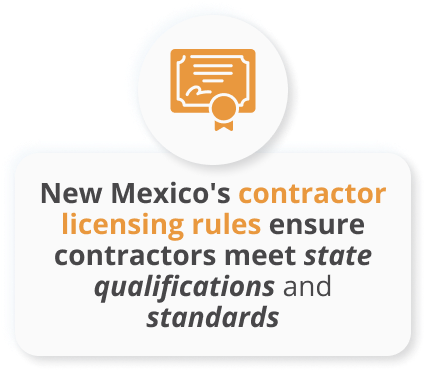Understanding and following the contractor licensing process in New Mexico is essential for anyone wishing to work legally in the state’s construction industry. The New Mexico Regulation and Licensing Department (RLD), through its Construction Industries Division (CID), has established clear rules and requirements that contractors need to meet in order to obtain and keep a valid license. These regulations ensure that contractors are qualified, financially responsible, and in compliance with state laws, which ultimately protect consumers and uphold the integrity of the construction industry.

Issuing Agency and Scope
The Construction Industries Division (CID) of the Regulation and Licensing Department is the issuing agency for all contractor licenses in New Mexico. The rules outlined in Title 14, Chapter 6, Part 3 apply to any individual or entity seeking to obtain a contractor’s license or certificate from CID. This includes various business structures such as corporations, limited liability companies (LLCs), joint ventures, partnerships, and sole proprietorships.
Statutory Authority and Objective
The statutory authority for these regulations is rooted in several sections of the New Mexico Statutes Annotated (NMSA) 1978, including Sections 60-13-9, 60-13-12, and others. The primary objective of these rules is to establish a clear and enforceable framework for contractor licensing in New Mexico, ensuring that all contractors meet the necessary qualifications and adhere to industry standards.

General Requirements for Licensing
To act as a contractor in New Mexico, an entity must obtain a valid license issued by CID. There are several key requirements and restrictions to be aware of:

Qualified Business Entities
Licenses are issued only to business entities that employ or are owned by qualifying parties certified by CID. The license authorizes the entity to engage in contracting within the specific classification listed on the license.

Non-Transferability
Licenses are non-transferable and can only be used by the entity to which they are issued. If a licensee allows another person or entity to use its license, it may face disciplinary actions, including license revocation.

Business Name Restrictions
An entity must not use a business name that implies expertise in a construction trade not covered by the license classification it holds.

Address and Communication
Licensees must keep CID updated with their current address and promptly notify CID of any changes. Failure to do so could result in disciplinary action.
Types of Entities Eligible for Licensing
Different types of business entities are eligible for contractor licenses in New Mexico, each with specific requirements:
- Corporations, LLCs, LPs, LLPs
- Joint Ventures
- Partnerships
- Sole Proprietorships
Proof of Financial Responsibility
As part of the licensing process, contractors must demonstrate financial responsibility by providing a $10,000 bond underwritten by a corporate surety authorized to operate in New Mexico. The bond must cover the entire licensure period and serve as a guarantee that the contractor will address any code violations they cause. Claims against the bond must be made within two years following the final inspection or the issuance of a certificate of occupancy.
If a bond is canceled or expires, CID will notify the licensee, and a new bond must be provided to maintain the license. Failure to maintain an active bond will result in immediate license cancellation.
Aditional Insurance Requirements for New Mexico Contractor Licensing
Contractors in New Mexico are required to have additional insurance coverage beyond the surety bond when applying for a license. Specifically, contractors must carry Workers’ Compensation Insurance if they have employees. This insurance is mandatory and covers medical expenses, rehabilitation costs, and lost wages for employees who are injured on the job.
The Workers’ Compensation Administration mandates that all licensed entities obtain and maintain this coverage as part of their responsibility to protect workers. Proof of this insurance must be provided as part of the contractor’s license application process to ensure compliance with state regulations. Failure to maintain adequate workers’ compensation insurance can result in penalties, including the suspension or revocation of the contractor’s license.

Simplified Application and Certification Process

Complete Application
- Submit a fully completed application using the forms provided by the Construction Industries Division (CID).
- Incomplete applications will be rejected and must be resubmitted with all required information.

Six-Month Deadline
- You have six months from the application submission date to fulfill all licensing or certification requirements.
- If you don’t complete the process within this timeframe, your application will expire, and any fees paid will be forfeited.

Eligibility and Denial
- Applications may be denied if you have a disqualifying felony conviction or if your conduct violates the Construction Industries Licensing Act.
- Qualifying party certificates are required for certain licenses and are issued only to individuals 18 years or older.

Non-Transferable Certificatesn
- Qualifying party certificates are non-transferable and are specific to the individual who earned them.
- These certificates cannot be used by another person or transferred to a different individual.
How to Become a Qualifying Party (QP)
Becoming a Qualifying Party is a critical step in the licensing process. A QP is responsible for overseeing the work performed under the license and ensuring compliance with all applicable regulations. To become a QP, applicants must:
- Experience Requirement: Every contractor must have a qualifying individual (Qualifying Party) with the necessary work experience for the classification being applied for. This individual will need to meet specific work experience requirements:
- Two years (4,000 hours): For Residential Building, Building Specialties, Asphalt Bitumen and Concrete Construction, Fixed Works, Residential Wiring, Electrical Specialties, and certain Mechanical Specialties.
- Four years (8,000 hours): For General Building, certain Asphalt and Fixed Works, Electrical-Residential and Commercial, Electrical Distribution Systems, Mechanical, Plumbing, Natural Gas Fitting, HVAC, Process Piping, Fire Sprinklers, and Dry Chemical Fire Protection.
- Examinations: Pass the applicable trade exam(s) as well as a Contractor’s Business and Law exam. Pre-approval is required before scheduling these exams.
- Application Submission: After passing the exam, you’ll need to submit a completed application for your contractor’s license to PSI. Your application must include the following:
- A $36 application fee.
- Proof of a license bond.
- A tax registration number issued by the Department of Taxation and Revenue.
- A copy of the Qualifying Party’s certificate or test scores.
- Additionally, you’ll need to pay a license fee, which ranges from $150 to $300, depending on your classification.
- Exam Scheduling: Once approved, applicants can schedule their exams through PSI by calling or visiting the PSI website. Special accommodations and exams in Spanish are available upon request.
Licensing Requirements for Companies
Once a QP has passed the necessary exams, the company can apply for a contractor license. The application process involves submitting:

Completed License Application
Along with the application fee and any applicable license fees.

License Bond
A surety bond as proof of financial responsibility.

Tax Registration Certificate
Issued by the New Mexico Taxation and Revenue Department.

Corporate or LLC Documentation
If applicable, a certificate from the New Mexico Public Regulation Commission (NMPRC) or Secretary of State.

Qualifying Party Certification
A copy of the QP’s certificate or test scores, and the Business & Law exam score or course certificate.
The contractor licensing requirements in New Mexico are designed to ensure that all contractors operating within the state are qualified, financially responsible, and compliant with both state and local regulations. By adhering to these rules, contractors can maintain their licenses, avoid penalties, and contribute to a safe and professional construction industry in New Mexico. Whether you are a corporation, partnership, or sole proprietorship, understanding and fulfilling these requirements is crucial for long-term success in the construction field.
Frequently Asked Questions (FAQ)
These are common questions about General Contractor License in New Mexico.
The first step is to submit a classification determination request to the New Mexico Construction Licensing Services. This helps define the type of work you plan to do and is necessary before applying for any exams.
A Qualifying Party is an individual with the required work experience for the license classification you’re applying for. This person must have the necessary experience and pass relevant exams to qualify your business for a contractor license.
The work experience required varies by classification: two years (4,000 hours) for some residential and specialty classifications, and four years (8,000 hours) for general building, commercial, and other specialized trades.
Once the Qualifying Party application is approved, you can schedule your examination with PSI. You must complete the exam within six months of approval, or you will need to restart the application process.
After passing the exam, you need to submit a license application to PSI, which includes a $36 application fee, proof of a license bond, a tax registration number, and a copy of the Qualifying Party’s certificate or test scores.
The application fee is $36, plus an additional license fee that ranges from $150 to $300 depending on the classification.

